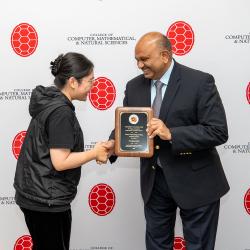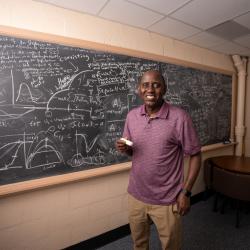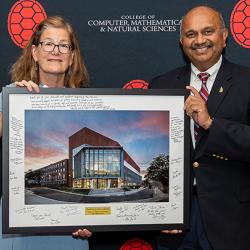Four Science Terps Awarded 2025 Goldwater Scholarships
Four undergraduates in the University of Maryland’s College of Computer, Mathematical, and Natural Sciences (CMNS) have been awarded 2025 scholarships by the Barry Goldwater Scholarship and Excellence in Education Foundation, which encourages students to pursue advanced study and research careers in the sciences, engineering and mathematics.
Over the last 16 years, UMD’s nominations yielded 53 scholarships—second in the nation only to Stanford.
UMD’s 2025 Goldwater Scholars are:
- Clara Abdelmalek, junior neuroscience major
- Harikesh Kailad, sophomore computer science and mathematics double major
- Luiz Mata Lopez, junior computer science and mathematics double major
- Benjamin Raufman, junior chemistry and mathematics double-degree student
They are among 441 Goldwater Scholars selected from 1,350 nominees nationally. Goldwater Scholars receive one- or two-year scholarships that cover the cost of tuition, fees, books, and room and board up to $7,500 per year.
“I am very proud of Clara, Harikesh, Luiz and Benjamin, whose amazing scholarship, dedication and hard work represent what CMNS strives for,” CMNS Dean Amitabh Varshney said. “Being named a Goldwater Scholar is an incredible accomplishment, and I cannot wait to see how they use this opportunity to make an even greater impact on the world.”
Since the program's first award in 1989, the Goldwater Foundation has honored 86 winners and five honorable mentions from UMD.
“The 2025 UMD Goldwater scholars are an exceptional group whose current and future research will impact science and society,” said CMNS Associate Dean of Undergraduate Education Robert Infantino, who has led UMD’s Goldwater Scholarship nominating process since 2001. “I am especially delighted that a UMD transfer student nominee was named a Scholar for the first time. The competition is also extra challenging for sophomores, so Hari’s accomplishment is also particularly noteworthy.”
Clara Abdelmalek
Abdelmalek began interning in Youssef Kousa’s viral neurobiology lab at Children’s National Hospital in Washington, D.C., the summer before her freshman year at Maryland. Kousa asked her to connect with over 30 investigators in the Prenatal Infection and Neurodevelopmental Genetics (PING) Consortium, which he founded to identify factors modulating prenatal brain injury and postnatal neurodevelopmental outcomes for Zika and other prenatal viral infections.
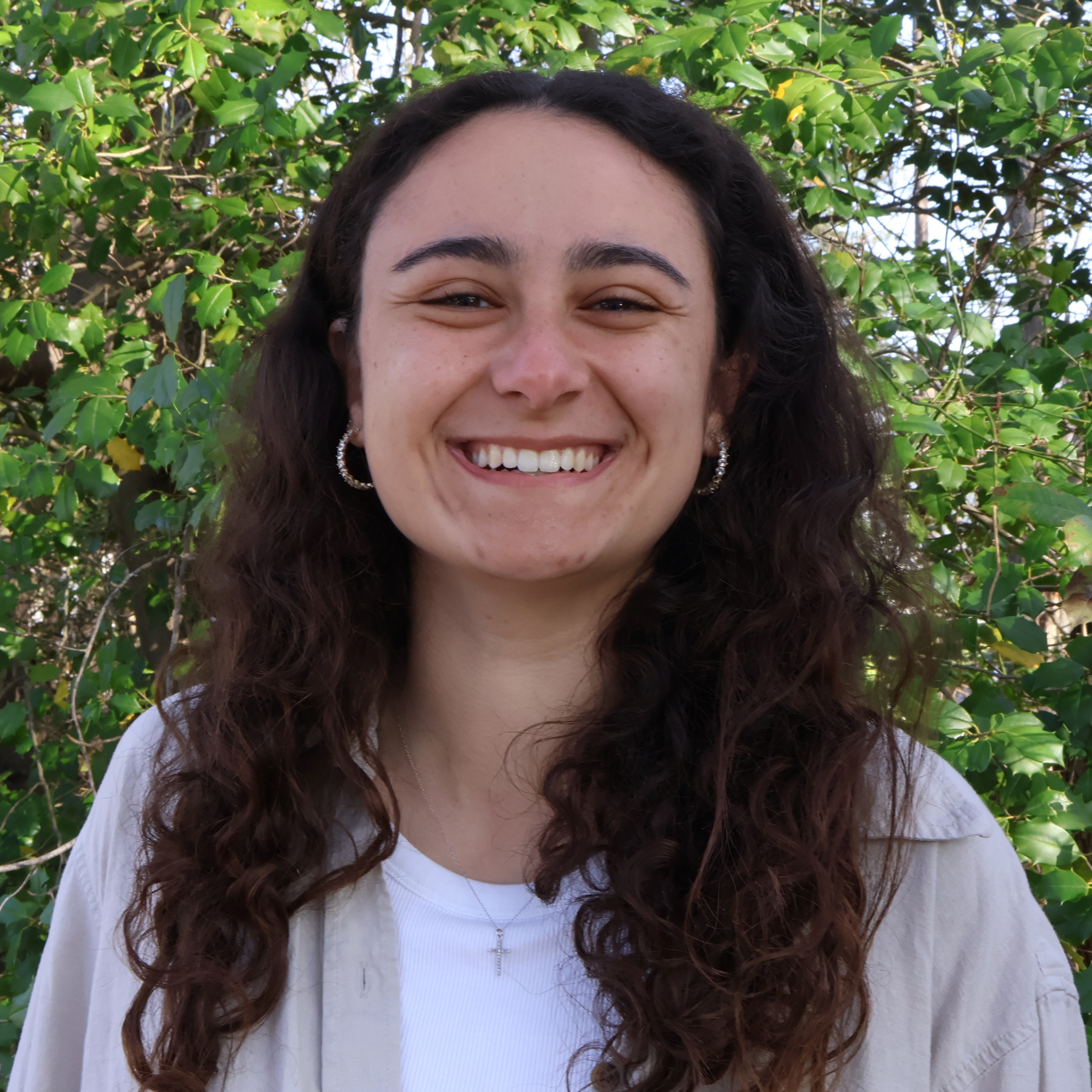
Abdelmalek collected detailed information about the consortium’s formation and the studies that comprise the PING clinical and genomic biobanks, which she published in a first-author paper earlier this year in the journal Pediatric Research.
Her work at Children’s led Abdelmalek to propose using an experimental animal system from Kousa’s lab for her Gemstone honors team research project. She proposed using the animal model to test potential drug treatments for prenatal Zika infection, which can cause severe brain injury and a spectrum of neurodevelopmental disorders. Abdelmalek’s 13-member group called Team VIRAL is working to test the effectiveness of the drugs in increasing survival rate, pinpoint the optimal doses for those drugs, evaluate the extent to which the drugs can mitigate prenatal brain injury and establish the drugs' safety. The Gemstone team received the Audience Choice Award at the Gemstone Do Good Showcase last year and 2nd place at the Library Awards for using the university libraries in its research.
"Clara will do extraordinary things with her career due to her intelligence, motivation and willingness to pursue difficult tasks,” said Erin Tran, the Gemstone team’s mentor and a senior lecturer in UMD’s Department of Cell Biology and Molecular Genetics. “One of Clara’s strongest attributes is her ability to take initiative and turn ideas into practical plans and experimental progress. She is excellent at asking probing questions that guide the direction of the research project, which is one of the most important aspects of being a scientist."
Abdelmalek also spent a year in Mark Batshaw’s clinic at Children’s National Hospital, conducting developmental tests for children with autism, intellectual disabilities, ADHD and genetic disorders. She and a colleague analyzed the relationship between patient demographics and the age of autism diagnosis for almost 4,000 patients.
Outside the lab, Abdelmalek serves as president of Maryland Cru, a Christian ministry. She also received the Clifford and Camille Kendall CMNS Dean's Scholarship, Louise Ogle Scholarship, and Dean's Scholarship.
After graduation, Abdelmalek plans to pursue an M.D./Ph.D. and focus on personalized medicine.
“I aim to build on my neuroscience background and research experience in genetics and neurodevelopment to develop personalized therapies for neurodevelopmental disorders,” she said.
Harikesh Kailad
Kailad began conducting research at UMD with Computer Science Professor Bill Gasarch in high school. He currently works in the Maryland Cybersecurity Center with Computer Science Assistant Professor Ian Miers, building systems that enable forums that both preserve privacy and allow for moderation, which helps prevent spammers and trolls. Kailad developed a full-fledged flexible system that allows services such as Wikipedia and Reddit to use his framework. He also began working on a project using multiparty computation for anonymous private state, which is when two or more parties receive an output of a computation based on their combined data without revealing their own data to the other parties.
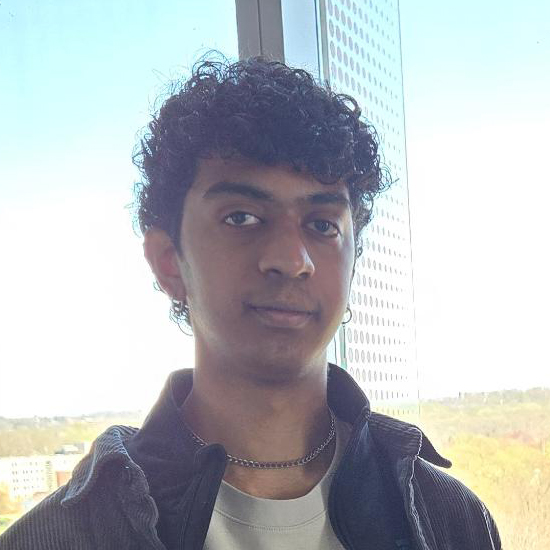
"Hari has shown consistent initiative, pushing himself in coursework, research and teaching,” Miers said. “As a freshman, he taught a student-led class on binary exploitation with an ambitious plan to cover beyond what is covered in even the upper-level security class. At the same time, he completed an independent study with me on zero-knowledge proofs that resulted in a paper to appear at USENIX Security 2025, a top-tier peer-reviewed venue in computer security research.”
Kailad also works with Dana Dachman-Soled, an associate professor of electrical and computer engineering, on the security of post-quantum systems. This collaboration began when Kailad participated in the Research Experience for Undergraduates in Combinatorics, Algorithms, and AI for Real Problems at UMD.
Cryptography currently used to secure the web is vulnerable to attacks by quantum computers, but the security of post-quantum cryptosystems being deployed is not well studied. Kailad wrote code to attack Kyber, a post-quantum cryptosystem finalized by the NIST standardization process. His attack transforms side-channel information that leaks from the system into algebraic information that can then be used to attack the system and find secret keys.
Kailad serves as president of the Cybersecurity Club, designed and taught two student-initiated courses, cofounded a theoretical computer science reading group, and is a member of a top-ranking Capture the Flag team that participates in cybersecurity competitions on the international level. While at UMD, he received a CMNS Alumni Network Summer Research Award and a Maryland Cybersecurity Center Travel Grant.
After graduation, Kailad plans to pursue a Ph.D. in computer science and contribute to cryptography and private technology development.
“I am extremely excited about recent advancements in security and cryptography and strongly interested in bringing anonymity and privacy to the web by using and improving privacy-enhancing technologies and answering questions about the security and efficiency of such systems,” he said.
Luiz Mata Lopez
Mata Lopez is a first-generation college student who was directly admitted to UMD’s limited-enrollment computer science program as a transfer student from Montgomery College in fall 2023.
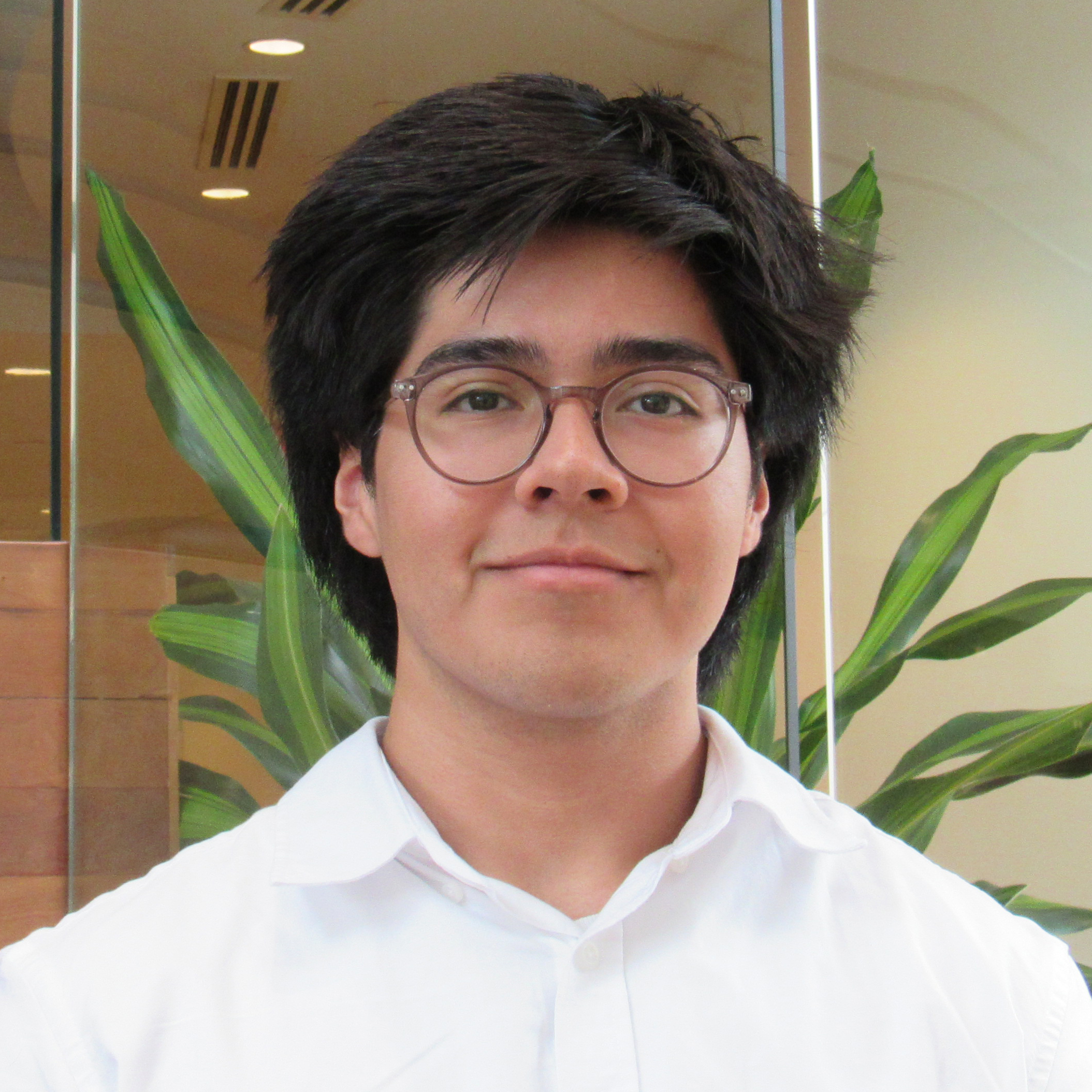
He was not unfamiliar with the College Park campus, though. He spent the summer of 2022 at UMD participating in a Research Experiences for Undergraduates program called BRIDGE (Bioinformatics Research In Data science for GEnomics), which is run by the UMD Center for Bioinformatics and Computational Biology. In the BRIDGE program, Mata Lopez worked with Computer Science Assistant Professor Erin Molloy to computationally address the problem of estimating the evolutionary histories of many species. Specifically, he worked to speed up the performance of an existing software package to improve usability for biologists.
After transferring to UMD, he rejoined Molloy’s research group to develop methods for fast reconstruction of tumor evolution. He conducted a preliminary study elucidating the detrimental effects of using standard approaches on cancer data and started working on multiple algorithms that address large-scale genome losses, which refer to a significant evolutionary process involving the deletion of extensive portions of a genome.
"Luiz is extremely talented. In our group meetings, he regularly presents his own algorithmic ideas at the whiteboard and responds to questions on the fly—skills typically honed during the transition from undergraduate to graduate studies,” Molloy said. “He is also deeply passionate about STEM research and has presented at Montgomery College and other forums to inspire fellow undergraduates to get involved. I am excited to see Luiz's proposed research come to fruition with the generous support of the Goldwater Scholarship."
Beginning in summer 2023, Mata Lopez interned at the National Institutes of Health’s National Library of Medicine on a project to use nanopore sequencing to elucidate the biological mechanisms of mobile DNA elements in the context of cancer development.
Last summer, he interned at the Broad Institute of MIT and Harvard on a dilated cardiomyopathy drug discovery pipeline. He merged imaging datasets from CRISPR and known responsive drug screens and analyzed them to identify gene edits that have similar effects as the drugs.
Mata Lopez served as a Montgomery College STEM Ambassador and received the Jack Kent Cooke Undergraduate Transfer Scholarship and Frederick Douglass Scholarship from UMD. His passion for education led him to create educational content with students nationwide to introduce biological sciences majors to bioinformatics software development.
Mata Lopez plans to pursue a Ph.D. in computer science, specializing in computational biology and statistical methods to better understand the origins of genetic disorders.
“I aim to address the genetic origins of diseases that have long mystified clinicians,” he said. “Recent computational advancements have enabled biomedical data analysis at an incredibly large scale and have led to a better understanding of disease mechanisms and rapid drug development.”
Benjamin Raufman
Raufman, a Banneker/Key Scholarship recipient in the Integrated Life Sciences program in the Honors College, has been conducting research in a chemistry lab at Towson University since his sophomore year of high school.

There, he investigates the synthesis and properties of inorganic nanostructures, specifically gold nanoclusters. Raufman developed a reliable and reproducible synthetic protocol to make platinum-doped gold-11 nanoclusters—research he published in a first-author paper earlier this year. Platinum doping enhances the reactivity and stability of the gold nanoclusters and alters the electronic and optical properties of the nanoclusters, leading to unique characteristics. He also helped engineer nanoclusters with fluorescent ligands, which led to a co-authored paper published in 2024.
He was honored with a Maryland American Chemical Society Chapter Summer Research Grant in 2022, and his research presentation was selected for the prestigious Sci-Mix at the American Chemical Society Spring Meeting in 2024.
"I have known Benjamin for five-plus years, and he has consistently demonstrated exceptional scientific knowledge and experimental skill. This includes reading the literature, thinking critically and independence in designing experiments,” said Mary Sajini Devadas, an associate professor of chemistry at Towson University. “Since joining my lab as a sophomore in high school as part of my 2020 TU foundation grant titled ‘Building Science Identity: Fostering STEM influx from local high schools,’ he has worked nonstop while balancing his coursework and research."
Since his freshman year at UMD, Raufman also worked with Chemical and Biomolecular Engineering Professor Srinivasa Raghavan to assess the effectiveness of polymer-based hemostatic agents needed during surgery and in emergency rooms to control bleeding after traumatic injury.
For the past two summers, Raufman interned with Jian-Ying Wang, the Joseph and Corrine Schwartz Professor of Surgery and a Professor of Pathology at the University of Maryland School of Medicine. There, he investigated the roles of circular RNAs, specifically circCdr1as, in regulating intestinal mucosal regeneration and human diseases. Through this work, he co-authored a paper published in 2024 in the journal JCI Insight.
Outside of class, Raufman is a refugee youth tutor and emergency department volunteer, and he played alto saxophone in the University Jazz Band. After he graduates, he plans to pursue an M.D./Ph.D. in structural biology.
“I aim to advance the mechanistic understanding of cancer with the long-term goal of developing novel targeted therapies,” he said. “My clinical experience will ground my research in real-world relevance and enable me to translate advances in structural and chemical biology into clinically efficacious and affordable treatments.”



